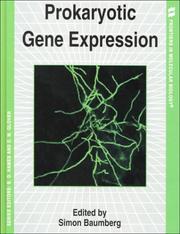| Listing 1 - 10 of 483 | << page >> |
Sort by
|
Book
Year: 2017 Publisher: Amsterdam, [Netherlands] : Academic Press,
Abstract | Keywords | Export | Availability | Bookmark
 Loading...
Loading...Choose an application
- Reference Manager
- EndNote
- RefWorks (Direct export to RefWorks)
Begins with an historical overview of the early discoveries surrounding DNA methylation in the mammalian brain and then explores the evidence supporting a role for this epigenetic mechanism in controlling gene expression programs across the lifespan in both normal and diseased states. Chapters describe new directions and technological advances, and provide an overview of what the future holds for this exciting new field. This book is ideal for medical, graduate and advanced undergraduate students, but is also a great resource for researchers who need a broad introduction to the dynamic nature of DNA that sheds light on evolving concepts of gene-environment interaction and their effects on adaptation and neuropsychiatric disease.--

ISBN: 9781483217536 1483217531 9780121852757 Year: 1993 Publisher: San Diego, California
Abstract | Keywords | Export | Availability | Bookmark
 Loading...
Loading...Choose an application
- Reference Manager
- EndNote
- RefWorks (Direct export to RefWorks)
Neuropeptide Analogs, Conjugates, and Fragments
Book
Year: 2022 Publisher: London : IntechOpen,
Abstract | Keywords | Export | Availability | Bookmark
 Loading...
Loading...Choose an application
- Reference Manager
- EndNote
- RefWorks (Direct export to RefWorks)
Gene expression is dependent on multiple steps, including transcription, RNA processing, and translation. Importantly, recent studies revealed that gene expression is regulated by chromatin structures and non-coding RNA profiles. Elucidating the molecular mechanisms may contribute to the development of novel therapeutics for aging-related diseases, including cancer and neurodegenerative diseases. This book provides a comprehensive overview of gene expression and its role in human disease. It consists of nine chapters organized into two sections on molecular mechanisms in controlling gene expression and the relationships between transcriptional control and human disease.
Multi
ISBN: 9780128004715 0128004711 9780127999586 0127999582 9780127999586 Year: 2016 Publisher: Amsterdam, [Netherlands] : Academic Press,
Abstract | Keywords | Export | Availability | Bookmark
 Loading...
Loading...Choose an application
- Reference Manager
- EndNote
- RefWorks (Direct export to RefWorks)
Epigenetic Gene Expression and Regulation reviews current knowledge on the heritable molecular mechanisms that regulate gene expression, contribute to disease susceptibility, and point to potential treatment in future therapies. The book shows how these heritable mechanisms allow individual cells to establish stable and unique patterns of gene expression that can be passed through cell divisions without DNA mutations, thereby establishing how different heritable patterns of gene regulation control cell differentiation and organogenesis, resulting in a distinct human organism with a variety of differing cellular functions and tissues. The work begins with basic biology, encompasses methods, cellular and tissue organization, topical issues in epigenetic evolution and environmental epigenesis, and lastly clinical disease discovery and treatment. Each highly illustrated chapter is organized to briefly summarize current research, provide appropriate pedagogical guidance, pertinent methods, relevant model organisms, and clinical examples. - Reviews current knowledge on the heritable molecular mechanisms that regulate gene expression, contribute to disease susceptibility, and point to potential treatment in future therapies - Helps readers understand how epigenetic marks are targeted, and to what extent transgenerational epigenetic changes are instilled and possibly passed onto offspring - Chapters are replete with clinical examples to empower the basic biology with translational significance - Offers more than 100 illustrations to distill key concepts and decipher complex science.
Periodical
ISSN: 18727298 1567133X Year: 2002 Publisher: Amsterdam ; New York : Elsevier Science,
Abstract | Keywords | Export | Availability | Bookmark
 Loading...
Loading...Choose an application
- Reference Manager
- EndNote
- RefWorks (Direct export to RefWorks)
Gene Expression --- Central Nervous System --- Central nervous system --- Gene expression --- Gene Expression. --- Gene expression. --- Genes --- Expression, Gene --- Expressions, Gene --- Gene Expressions --- Expression --- Genetic regulation --- Gene Expression Profiling

ISBN: 128037540X 9786610375400 0585483418 9780585483412 9781280375408 0199636044 9780199636044 0199636036 9780199636037 6610375402 Year: 1999 Publisher: Oxford New York Oxford University Press
Abstract | Keywords | Export | Availability | Bookmark
 Loading...
Loading...Choose an application
- Reference Manager
- EndNote
- RefWorks (Direct export to RefWorks)
Prokaryotic gene expression is not only of theoretical interest but also of highly practical significance. It has implications for other biological problems, such as developmental biology and cancer, brings insights into genetic engineering and expression systems, and has consequences for important aspects of applied research. For example, the molecular basis of bacterial pathogenicity has implications for new antibiotics and in crop development. Prokaryotic Gene; Expression is a major review of the subject, providing up-to-date coverage as well as numerous insights by the prestigious authors. Topics covered include operons; protein recognition of sequence specific DNA- and RNA-binding sites; promoters; sigma factors, and variant tRNA polymerases; repressors and activators;; post-transcriptional control and attenuation; ribonuclease activity, mRNA stability, and translational repression; prokaryotic DNA topology, topoisomerases, and gene expression; regulatory networks, regulatory cascades and signal transduction; phosphotransfer reactions; switch systems, transcriptional and translational modulation, methylation, and recombination mechanisms; pathogenicity, toxin regulation and virulence determinants; sporulation and genetic regulation of antibiotic production;; origins of regulatory molecules, selective pressures and evolution of prokaryotic regulatory mechanisms systems. Over 1100 references to the primary literature are cited. Prokaryotic Gene Expression is a comprehensive and authoritative review of current knowledge and research in the area. It is; essential reading for postgraduates and researchers in the field. Advanced undergraduates in biochemistry, molecular biology, and microbiology will also find this book useful.
Gene expression. --- Genes --- Genetic regulation --- Expression
Book
ISBN: 1847359760 9781847359773 1847359779 9781847359766 Year: 2013 Publisher: Shawbury, England : Smithers Rapra,
Abstract | Keywords | Export | Availability | Bookmark
 Loading...
Loading...Choose an application
- Reference Manager
- EndNote
- RefWorks (Direct export to RefWorks)
Over the past decade, the transient gene expression (TGE) technology platform has been actively pursued to produce a wide range of therapeutic proteins, monoclonal antibodies, and vaccines for mainly preclinical assessment, due to its short development times and low overall cost. This book updates the latest advances in the field, with focusing on systematic description of the technology from cell lines, cell culture conditions, vector construction, expression strategy, current protocols, optimisation of the procedure, and potential for clinical application. As a conclusion, the author foresee
Gene expression. --- Genes --- Genetic regulation --- Expression
Book
ISBN: 9781783320585 1783320583 9781842658192 1842658190 Year: 2014 Publisher: Oxford, U. K. : Alpha Science International Ltd.,
Abstract | Keywords | Export | Availability | Bookmark
 Loading...
Loading...Choose an application
- Reference Manager
- EndNote
- RefWorks (Direct export to RefWorks)
Gene expression --- Genes --- Genetic regulation --- Expression
Book
ISBN: 9780443153525 Year: 2023 Publisher: [Place of publication not identified] : Academic Press,
Abstract | Keywords | Export | Availability | Bookmark
 Loading...
Loading...Choose an application
- Reference Manager
- EndNote
- RefWorks (Direct export to RefWorks)
The Regulatory Genome in Adaptation, Evolution, Development, and Disease synthesizes insights from recent genomic and gene expression studies across organisms, from humans to plants, animals, and single cell life, exploring common roles gene regulation plays in adaptive evolution, developmental biology and susceptibility to disease. The book sheds light on gene regulation across evolutionary timelines, illuminating new areas of focus and future research. Chapters consider key elements in gene expression regulation, fundamentals of genomic alterations over time, and in response to environmental and local conditions, epigenetics in adaptive evolution, and adaptive gene regulation in healthy processes and developmental biology, and in disease biology. Throughout the book, a comparative approach is adopted across organisms to highlight common evolutionary themes and genome diversity revealed by recent sequencing and GWAS studies, as well as how this informs our understanding of human adaptive evolution. The book finishes by detailing how we can use this knowledge to impact disease outcomes and healthy human metabolism, development, and physiology. Reviews key elements in the regulation of gene expression and modes of studying gene regulation across evolutionary timelines Adopts a cross-species view, synthesizing recent sequencing and GWAS studies across organisms to draw out fresh meaning and highlight pathways for future research Considers altered gene expression associated with developmental defects and disease, as well as healthy biology and physiology, and our adaptive response to disease influence.
Genetic regulation. --- Gene expression --- Gene expression regulation --- Gene regulation --- Biosynthesis --- Cellular control mechanisms --- Molecular genetics --- Regulation --- Gene expression. --- Medical genetics. --- Gene Expression Regulation
Book
Abstract | Keywords | Export | Availability | Bookmark
 Loading...
Loading...Choose an application
- Reference Manager
- EndNote
- RefWorks (Direct export to RefWorks)
Scientists today have access to an unprecedented arsenal of high-tech tools that can be used to thoroughly characterize biological systems of interest. High-throughput “omics” technologies enable to generate enormous quantities of data at the DNA, RNA, epigenetic and proteomic levels. One of the major challenges of the post-genomic era is to extract functional information by integrating such heterogeneous high-throughput genomic data. This is not a trivial task as we are increasingly coming to understand that it is not individual genes, but rather biological pathways and networks that drive an organism’s response to environmental factors and the development of its particular phenotype. In order to fully understand the way in which these networks interact (or fail to do so) in specific states (disease for instance), we must learn both, the structure of the underlying networks and the rules that govern their behavior. In recent years there has been an increasing interest in methods that aim to infer biological networks. These methods enable the opportunity for better understanding the interactions between genomic features and the overall structure and behavior of the underlying networks. So far, such network models have been mainly used to identify and validate new interactions between genes of interest. But ultimately, one could use these networks to predict large-scale effects of perturbations, such as treatment by multiple targeted drugs. However, currently, we are still at an early stage of comprehending methods and approaches providing a robust statistical framework to quantitatively assess the quality of network inference and its predictive potential. The scope of this Research Topic in Bioinformatics and Computational Biology aims at addressing these issues by investigating the various, complementary approaches to quantify the quality of network models. These “validation” techniques could focus on assessing quality of specific interactions, global and local structures, and predictive ability of network models. These methods could rely exclusively on in silico evaluation procedures or they could be coupled with novel experimental designs to generate the biological data necessary to properly validate inferred networks.
Validation --- Gene Expression --- Network Inference --- bioinformatics
| Listing 1 - 10 of 483 | << page >> |
Sort by
|

 Search
Search Feedback
Feedback About
About Help
Help News
News